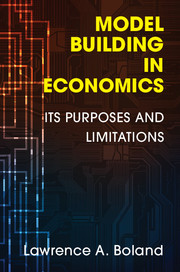Book contents
- Frontmatter
- Dedication
- Contents
- Preface
- Acknowledgements
- Prologue: Model building yesterday versus today
- Part I Theoretical Models
- Part II Empirical Models
- Part III Testing and Models
- Part IV Methodological Considerations
- 11 Model building from a philosophy of science perspective
- 12 Choosing model-building methods
- Epilogue: Against putting ideology ahead of realism
- Bibliography
- Name index
- Subject index
11 - Model building from a philosophy of science perspective
Published online by Cambridge University Press: 05 October 2014
- Frontmatter
- Dedication
- Contents
- Preface
- Acknowledgements
- Prologue: Model building yesterday versus today
- Part I Theoretical Models
- Part II Empirical Models
- Part III Testing and Models
- Part IV Methodological Considerations
- 11 Model building from a philosophy of science perspective
- 12 Choosing model-building methods
- Epilogue: Against putting ideology ahead of realism
- Bibliography
- Name index
- Subject index
Summary
[W]e look upon economic theory as a sequence of conceptional models that seek to express in simplified form different aspects of an always more complicated reality. … Each model is defined by a set of postulates, of which the implications are developed to the extent deemed worthwhile in relation to the aspects of reality expressed by the postulates. The study of the simpler models is protected from the reproach of unreality by the consideration that these models may be prototypes of more realistic, but also more complicated, subsequent models.
Tjalling Koopmans [1957, pp. 142–3]Treating the development of modelling as an epistemic genre – that is, as a practical mode of reasoning to gain knowledge about the economic world – does help to part the clouds that obscure the historical gaze. It reveals to us that mathematics grew up in two styles of reasoning in economics at more or less the same time in the late nineteenth century: the method of mathematical postulation and proof and the method of hypothetical modelling using mathematical models. …
No doubt, there were both descriptive and analytical aims for the early economists who created models, but there came a marked divergence after the interwar period so that statistical (econometric) modellers concentrated on theoretically informed descriptions that could be used for measurement and hypothesis testing, while mathematical modellers concentrated on providing accounts that established concepts and sparked hypothesis formation and theory development.
Mary Morgan [2012, pp. 18 and 388]It is not clear what Morgan means by ‘theory development’ here, given her (I think correct) claim that modelling has become the primary way of doing economic science. If modelling is what economists mean by theory, how can there be a stage of theorising that progresses beyond modelling? It is easier to understand the claim that economics engages with the real world through econometrics. Presumably, econometrics is ‘theoretically informed’ when it is informed by the kind of modelling that is the subject of Morgan’s book. But how do models provide information to econometricians, unless there is some reason to expect similarities between properties of models and properties of the real world? I cannot see how the practice of modelling can have scientific value unless models can provide genuine explanations of the phenomena of the real world.
Robert Sugden [2013, p. 113]- Type
- Chapter
- Information
- Model Building in EconomicsIts Purposes and Limitations, pp. 221 - 231Publisher: Cambridge University PressPrint publication year: 2014



